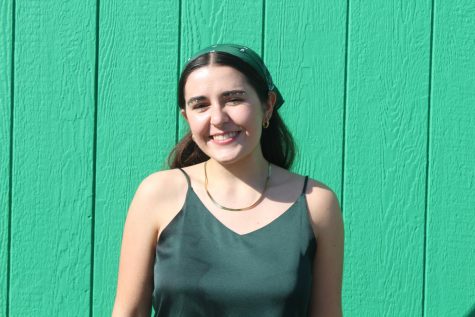Senior Class Faces 2021-2022 Elective Scheduling Conflicts
Photo Courtesy of Caroline Lehman via Canvas
The struggle to balance STEM and humanities courses at ERHS.
November 2, 2021
At the beginning of the 2021-2022 school year, many Eleanor Roosevelt High School (ERHS) seniors experienced an abundance of scheduling conflicts and confusion, particularly in regards to non-STEM elective courses.
Despite the seemingly wide variety of humanities-related elective courses at ERHS, many of these classes are offered during only one period per school day. Whether it be that students have a conflicting schedule, or a class is labeled as “full,” this limits eager students’ ability to take these fun and engaging classes. Senior Melannie Valenzuela has wanted to take Advanced Placement (AP) Spanish 5 “all of high school” and planned to take it this year, but was unable to as her morning internship for the Science and Technology (ST) program conflicts with the class only being offered during third period. She said it was “the only class [she] was truly excited for” this year. Senior Divya Chappa had the same problem with her morning internship and AP Spanish 6 only occurring in one morning class.
Many students think the STEM focus at ERHS has played a significant role in the limited scheduling of creative electives. Senior Kenny Graninger, who was unable to take Drama 2 this year, noted that ERHS often prioritizes students taking STEM courses “to make [the school] look better” to the point of “completely disregard[ing] what the students are actually interested in.” Valenzuela speculated that the “ST focus” has a significant impact on elective scheduling, recalling that she had to stop taking orchestra after freshman year due to her “advanced science requirements” for the ST program. These restrictive requirements also made her take Physical Education and Health over the summer.
These unfortunate cases have devastated the class of 2022 at ERHS. Senior Sydney Endres could not take both Drama 2 and Student Government Association (SGA) because not only were they offered only during one period, but they were also double booked with her Research Practicum (RP) class. Endres said her situation was “extremely upsetting.” She was “very excited to build connections with these teachers” and now is unable to. Graninger described these problems as “frustrating” and “stressful,” especially because this is all happening during his senior year, his last chance to take these classes.
Seniors also worry about the implications these problems will have on their college applications. Valenzuela said that AP Spanish 5 was the “one AP class [she] 100% knew” [she] would excel in” and an AP test score she was “looking forward to submitting” in applications. Endres worries about the redundancy her transcript will show as this is her second time taking Basic Guitar. Because one of her backup electives, Intermediate Guitar, was not offered during an available period for her to take it, she is in Basic Guitar for the second year in a row, while doing intermediate work in the class.
These scheduling problems have been particularly difficult for students to grapple with due to the very last minute notification they got about scheduling issues. Students got to request their courses for this school year in the middle of last school year and even went through an approval period in the spring, in which their courses were to be entered into SchoolMAX. Chappa, Valenzuela, and Endres all had their correct courses appear in SchoolMAX last school year. Endres even recalled talking “specifically to the [Drama 2 and SGA] teachers to gain approval.” The scheduling conflicts were so disconcerting because students were not informed of the issues until less than two weeks before the first day of school. The schedules were released on August 27, 2021. The late notice left many feeling confused and stressed.
Students proposed several solutions to this problem for the scheduling department at Roosevelt. Valenzuela suggested more advanced notice being given to students about which electives are offered during certain periods. She also mentioned that schedules “need to be done before the first month of school” so that if there are complications, students can have time to decide what replacement courses they want to take; and subsequently have a full schedule for the first day. Valenzuela and Chappa also both proposed adding more class periods for certain electives. Chappa believes that schedulers should “ensure that popular courses” have at least a morning and an afternoon period. Endres shared this sentiment and had an idea for the parameters, saying allowing at least two class periods for each elective “if more than 12 people request the course.” She speculated that this would also “allow for overflow when schedules are adjusted in the beginning of the year.” Graninger’s solution entailed having students visit with their counselors on “designated days towards the end of the year” to prepare for the next school year.
Ultimately the predicaments with humanities-related courses and scheduling hurts everyone involved and needs to be addressed. No more seniors should have to miss out on taking fun and enriching elective courses. Although not much can be done schedule-wise for the class of 2022 at this point, hopefully next year compromises and flexibility can minimize these problems.




